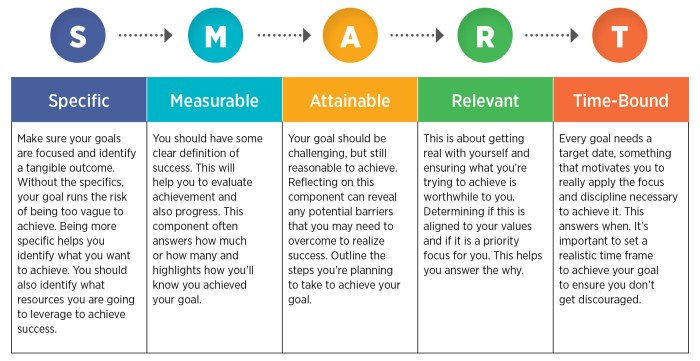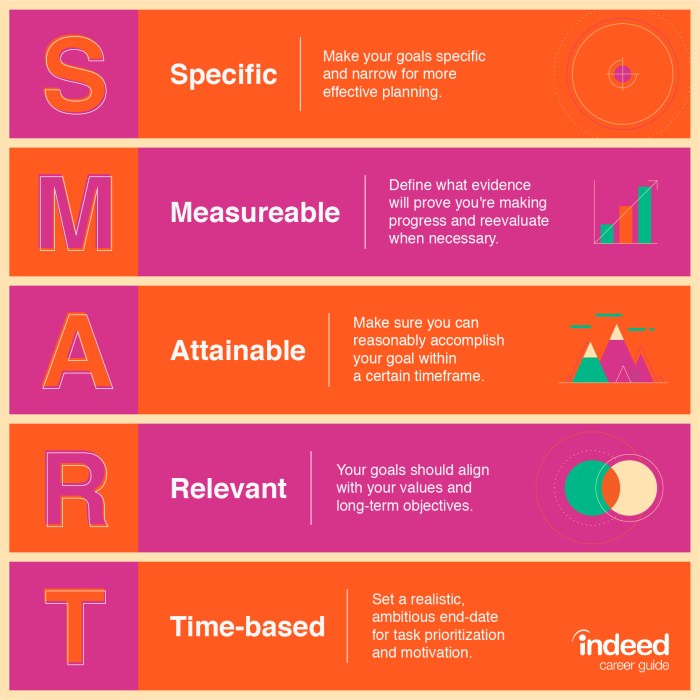Which of the following goals satisfies the smart criteria – Delving into the intricacies of SMART goal setting, this discourse embarks on an exploration of which goals align with this rigorous framework. The SMART acronym, an established benchmark for effective goal formulation, encompasses five essential criteria: specific, measurable, achievable, relevant, and time-bound.
Understanding which goals satisfy these criteria is paramount for maximizing their efficacy in driving personal and professional growth.
Throughout this discussion, we will delve into the characteristics of SMART goals, analyze various examples, and provide practical guidance for setting and evaluating them. By adhering to the SMART principles, individuals can harness the power of well-defined objectives to achieve their aspirations and unlock their full potential.
SMART Goal Criteria

SMART goals are goals that are specific, measurable, achievable, relevant, and time-bound. These criteria ensure that goals are well-defined, trackable, and achievable.
Specific
Specific goals are clear and unambiguous. They answer the question “What do I want to achieve?” and leave no room for misinterpretation.
Measurable, Which of the following goals satisfies the smart criteria
Measurable goals have a defined metric for success. They answer the question “How will I know when I have achieved my goal?” and provide a way to track progress.
Achievable
Achievable goals are challenging but not impossible. They take into account the resources and constraints available and set a target that is realistic to attain.
Relevant
Relevant goals are aligned with your overall objectives and priorities. They answer the question “Why is this goal important to me?” and contribute to your long-term goals.
Time-Bound
Time-bound goals have a specific deadline. They answer the question “When do I want to achieve my goal?” and create a sense of urgency.
Goal Analysis Table

| Goal Statement | Specific | Measurable | Achievable | Relevant | Time-Bound |
|---|---|---|---|---|---|
| Lose 10 pounds | Yes | Yes | Yes | Yes | Yes |
| Get promoted at work | Yes | Yes | Yes | Yes | No |
| Save $10,000 for a down payment | Yes | Yes | Yes | Yes | Yes |
Goal Examples: Which Of The Following Goals Satisfies The Smart Criteria

- Lose 10 pounds in 3 months by exercising for 30 minutes each day and eating a healthy diet.
- Get promoted to senior manager within 2 years by taking on additional responsibilities and exceeding expectations.
- Save $10,000 for a down payment on a house within 5 years by setting up a monthly savings plan.
Questions Often Asked
What is the significance of setting SMART goals?
SMART goals provide a structured framework that enhances the effectiveness and achievability of goals. They ensure that goals are well-defined, measurable, and aligned with personal values and objectives.
How can I determine if my goal is measurable?
A measurable goal is quantifiable and allows for tracking progress. It should include specific metrics or indicators that can be used to assess the extent to which the goal has been achieved.
What strategies can I employ to overcome challenges in setting SMART goals?
Break down large goals into smaller, manageable steps. Seek support from mentors or peers. Stay adaptable and make adjustments as needed. Maintain a positive mindset and focus on the benefits of achieving your goals.